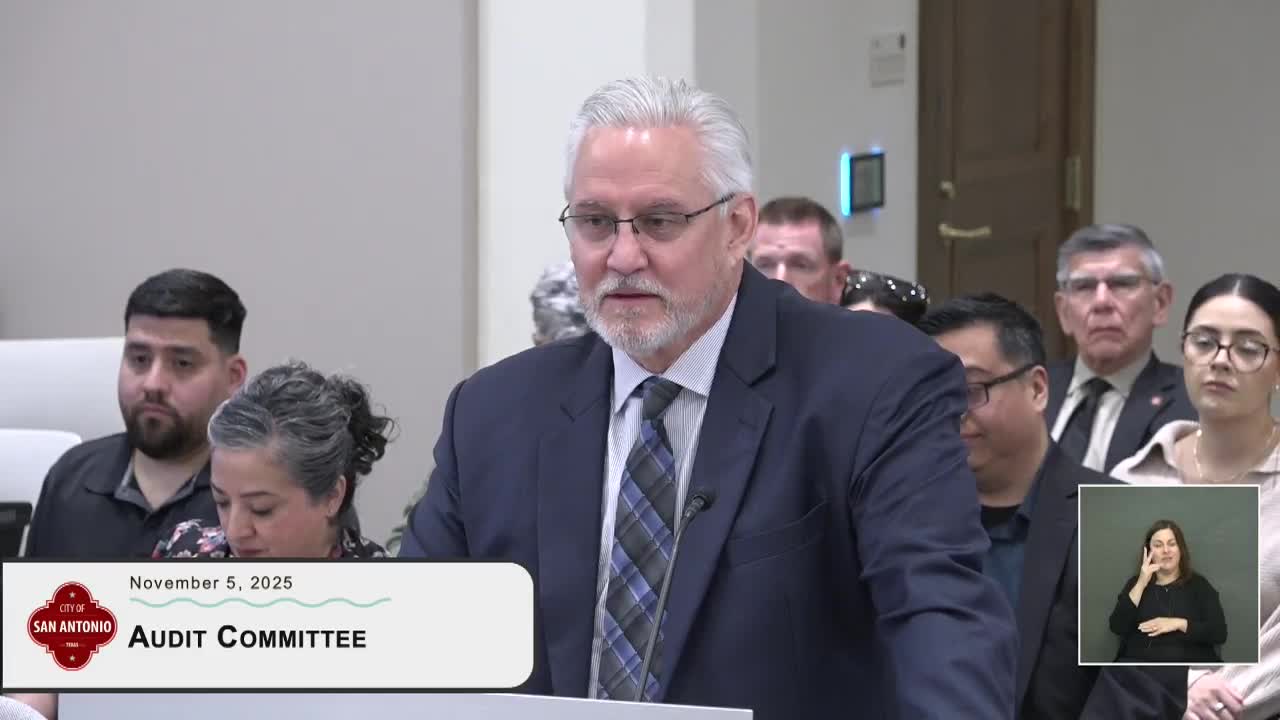City releases FY2026 high-profile procurement forecast; committee debates local preference, vendor due diligence and on-time contractor performance
Get AI-powered insights, summaries, and transcripts
Subscribe
Summary
City staff presented the FY2026 procurement forecast on Nov. 5, identifying 382 planned solicitations and 82 projects that meet the committee's high-profile criteria.
The Audit Committee on Nov. 5 received the City of San Antonio's FY2026 high-profile procurement forecast and a briefing on procurement policies and outreach.
Troy Elliott, chief financial officer, described an expanded annual forecast covering solicitations of $50,000 and up: the forecast lists 382 solicitations, of which 82 meet the committee's high-profile definition. Of those 82, Elliott recommended 22 be presented to this committee (pre- and post-solicitation briefings), 49 placed directly on the City Council consent agenda, four routed to city council B-session, and four to a separate aviation B-session. The remaining 300 solicitations would be handled via council consent or the city manager delegation.
Elliott reiterated the city's definition of "high profile": discretionary contracts generally valued at $1 million or more or contracts with high community interest, exceptional complexity, or nonstandard terms. He also summarized how procurement methods differ (low-bid invitation, request for competitive sealed proposals, requests for qualifications and proposals, and requests for offer) and reviewed local preference and other preference programs (local business preference, veteran-owned small business preference, SABoR-like small and emerging business programs and the airport DBE programs).
On local preference, Elliott said San Antonio's ordinance provides a 5% price preference for local vendors on low-bid solicitations between $50,000 and $500,000, and point-based preferences (10 points) for local businesses on discretionary procurements. He noted changes in recent years such as increasing the low-bid preference from 3% to 5%, extending the rule to some federal- and state-funded procurements when grantors permit, and allowing local nonprofits to qualify.
Committee members sought more detail on vendor due diligence and performance tracking. Elliott said procurement teams perform due diligence including reviewing Dun & Bradstreet records, state filings, banking reference requests, litigation checks and comparative evaluation matrices; the city attorney reviews litigation risks. Capital Delivery director Michael Shannon said the city maintains a list of non-responsible bidders and had about eight firms currently restricted from low-bid work for performance problems, and that change orders and timeliness are tracked as part of contract administration.
Council members also asked about emerging technologies. Elliott said AI is not currently used in procurement but will be considered as part of a future SAP/financial system upgrade to improve data and processes.
Next steps: the forecast document will be posted publicly; staff will accept committee feedback and present a revised briefing in December and again to the full City Council early in 2026. The Economic & Workforce Development Committee will continue stakeholder engagement, with final recommendations to council targeted for July 2026.
